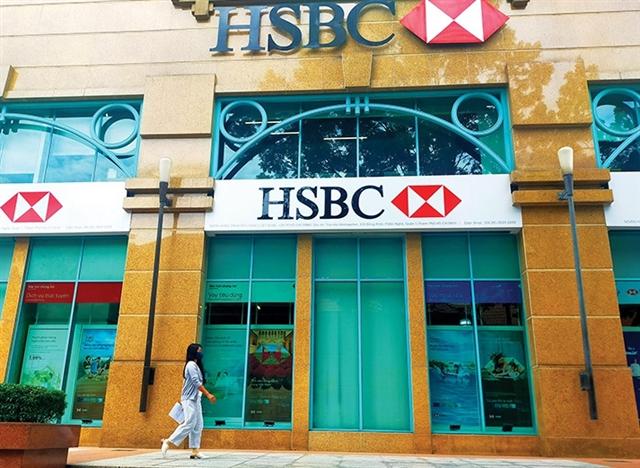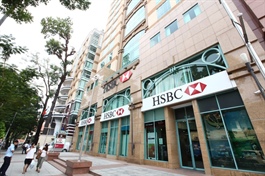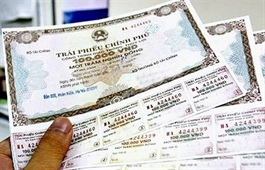Risk and thirst abound in bond market
Risk and thirst abound in bond market
Both local and overseas companies have ventured back into the bond market to cash in on low interest rates, but Vietnamese authorities are cautioning investors.

HSBC Vietnam. Photo: Le Toan
|
HSBC Vietnam last week became the first-ever foreign commercial bank to issue bonds in Vietnam, releasing a total of VND600 billion ($26.1 million) of bonds.
At a par value of VND100,000 ($4.30), HSBC Vietnam’s Lotus bond, named after Vietnam’s national flower, offers a fixed coupon rate of 5.8 per cent and a tenure of three years. With an order book oversubscribed by investors, the issuance is a testament to the bank’s strong brand in Vietnam.
“As we celebrate the 150th anniversary of HSBC’s arrival in Vietnam, this milestone issuance underscores our long-term commitment to this remarkable country,” said Tim Evans, CEO of HSBC Vietnam. “We wish to play a leading role in the ongoing development of the Vietnamese corporate sector together with Vietnam’s capital market long into the future. We plan to be a regular issuer as we look to position our franchise to continue to be the leading foreign bank in the market.”
In Vietnam, corporate bonds issuances increased by 25 per cent to VND280.14 trillion ($12.12 billion) in 2019 but remained a fraction of bank lending. It was 11.26 per cent of GDP, up from 9.01 per cent in 2018.
The first six months of 2020 saw the flood of corporate bonds with more than VND100 trillion ($4.34 billion), and real estate developers like Vingroup, Sun Group, and Novaland leading the way.
Meanwhile, domestic credit institutions mobilised more than VND47.3 trillion ($2.06 billion) via debt issuance, equaling 43.5 per cent of the whole of 2019.
Among banks, BIDV, HDBank, and VPBank are three largest bond issuers (VND7-15 trillion or $304.3-652.2 million).
Alternative income stream
The health crisis has forced vulnerable companies to “dash for cash” and raise money from various channels including corporate bond issuance.
The need for high yield is the biggest driver, especially for those with greater risk tolerance, as they downplay high valuations for this type of risky asset in the background of ultra-low interest rates. Central banks are also signalling to keep monetary policies loose to help economies weather the storm.
“Bonds have become attractive to retail investors recently due to the low interest rate environment and increased bond sales from banks and stock brokerage firms. As the COVID-19 pandemic negatively affects banks’ traditional lending business, selling bonds to retail investors has become an alternative income stream,” Ho Quoc Tuan, market analyst and a lecturer at Bristol University, told VIR. “Retail investors and savers are also seeking for instruments that pay higher interest rate than their savings accounts. This leads to the increase in demand for high-yield products such as bonds. The key issue here is that retail investors might not have enough financial literacy to make informed decisions regarding buying corporate bonds, especially those issued via private placement.”
Tuan emphasised that those bonds are risky assets with no credit ratings and no collaterals, and some are issued by overleveraged businesses with significant default risk. At the same time, not all can satisfy the strict and complicated requirements for issuing bonds.
“Corporate bonds provide an attractive cushion against falling interest rates at a time of heightened uncertainty,” said Nguyen Duc Hoang, macro analyst at Bao Viet Securities. “Yet, there are some companies issuing bonds worth 50-100 times their equity, and it is extremely dangerous. Furthermore, lack of independent credit ratings agencies can impede the transparency of local corporate bonds activities.”
“The risks of corporate bonds issued by banking group pale in comparison to other businesses as risk management initiatives for this particular group are strictly controlled by the state bank,” he added. “Yet, the unprecedented public health challenges have escalated soured debts and lowered profits for lenders.”
Besides, Hoang added, most banks and even foreign-invested lenders like HSBC have rolled out relief measures to distressed customers by reducing interest rates and these packages can hurt their own bread-and-butter lending services. “Risks stemming from virus-induced crash can also have adverse impacts on bank’s asset quality,” Hoang said.
Closing loopholes
The Ministry of Finance has once again cautioned investors over the high risks associated with high-yield corporate bonds. The ministry emphasised that investors should keep an eye out for abnormally high yields, as the issuers can fail to pay coupons in time.
In the worst case scenarios, a company running into financial difficulties could go bankrupt and leave its debts unpaid.
According to law firm Indochine Counsel, Decree No.81/2020/ND-CP released on July 9 and taking effect on September 1 is expected to increase transparency in capital mobilisation through corporate bonds and to protect the rights and benefits of investors.
Tuan of Bristol University also noted that Decree 81 has closed some serious loopholes as it requires that the capital raised through the private placement of bonds cannot exceed five times the equity capital reported in the most recent quarterly financial statements. This requirement limits the default risk of corporate bonds, especially those issued by overly leveraged companies.
Given that many bonds are issued without credit ratings, and retail investors are buying these bonds, it is possible that retail investors underestimate default risks.
Furthermore, Decree 81 specifies that two consecutive bond issuances by the same issuer should be at least six months apart. This requirement addresses the concern that bond issuers make several offerings consecutively to go around private placement regulations, which limits the number of investors involved in each issuance.

















